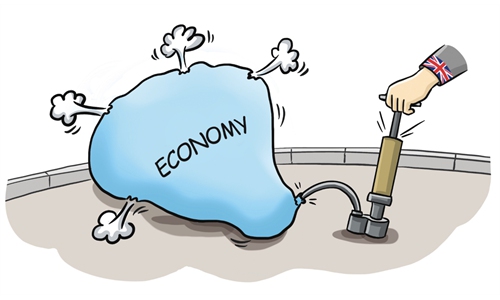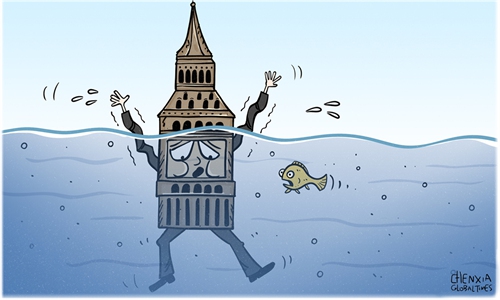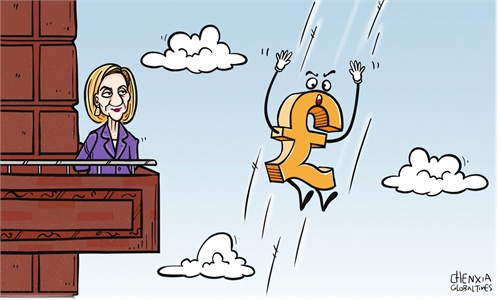
Illustration: Xia Qing/GT
Rishi Sunak officially took over as Britain's Prime Minister, becoming the country's third leader in seven weeks. He told Conservative lawmakers on Monday his first priority was delivering economic stability, Reuters reported.It is undoubtedly uncommon to see three prime ministers within a single year, an unmistaken sign of growing political instability in the country. To a large extent, it is because the British government has so far failed to demonstrate the ability to solve its domestic economic problems and reboot stagnant growth. Sunak's predecessor, Liz Truss, resigned as prime minister following a failed tax-cutting budget that rocked financial markets.
Now hopes of lifting Britain out of its economic doldrums have fallen on the new prime minister. In fact, Sunak's taking power is owed much to his impressive warning against Truss' tax cuts, and some believe that he has the experience of tackling with the economic crisis. He properly handled the challenge as chancellor during the pandemic in 2020 by offering huge financial support to back the then Johnson government's spending.
But it is important to note that while Sunak has all the experience and expertise on fiscal policy, no one should underestimate the scale of economic challenges and difficulties facing Britain today.
The UK is facing the worst cost-of-living crisis in decades, with a bleak economic outlook and fragile market confidence. Consumer prices rose 10.1 percent in September from a year earlier, returning to its fastest pace since 1982, while the British pound saw increased volatility recently and once plummeted to near parity with the US dollar. The OECD forecasts the UK economy is set for a zero percent growth in 2023, and Goldman Sachs even expects the UK economy will slip into recession in the fourth quarter this year, according to media reports.
So the questions for the UK economy is how to stabilize financial markets, calm investors, and avoid an economic collapse in the short term and how to stimulate economic growth to lift the economy out of its long-term downturn. Could such economic predicament be addressed simply by the change of prime minister?
The answer was already there several months when Truss and Sunak were competing on playing tough toward China in the previous leadership contest, an indication that neither of them had the answers for domestic economic problems. There is reason to worry that UK politicians may continue to hype up China-related topics once they fail to lift the economy.
Truss wanted to use tax cuts and energy spending subsidies to spur a rapid economic recovery, but she failed to answer where the money for subsidies would come from and how to deal with the public finance deficit. With her failure, her successor will inevitably face even narrower policy options.
Sunak called for unity in his Monday speech. Indeed, unity is essential if he is to adopt more decisive and forceful economic policies. But it is worth noting that when the economic situation is very dire and the market confidence is extremely fragile in the UK, whatever economic policy the new prime minister adopts is likely to make some dissatisfied, which is decided by the complexity of Britain's economic problems, the increasing division of interests of its people, and the diversity of political demands. Any policy choice is bound to require sacrifice of interests by some British people, and that is one of major dilemmas Sunak needs to navigate carefully.
It will take time to see whether Sunak can chart a new course for the country's economy to get out of doldrums.



